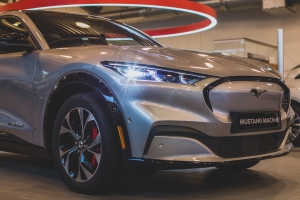Clean Energy Canada | New federal EV rebate caps strike the ‘Goldilocks’ balance
April 22, 2022

OTTAWA — Joanna Kyriazis, clean transportation program manager at Clean Energy Canada, made the following statement in response to Transport Canada updating its zero-emission vehicle incentive program to include more vehicles.
“Today’s update to the federal government’s purchase incentive program for electric vehicles is good news for the four in five Canadians who are open to buying an EV as their next car.
“More vehicles than ever before will now qualify for a rebate. For example, the popular Ford Mustang Mach-E at $51,500 should now be eligible. Additionally, a separate category introduced for larger vehicles, with a slightly higher vehicle cost cap, will open the gate for electric pickups.
“Canada’s new rebate caps—now $55,000 for cars and $60,000 for large vehicles—strike the right ‘Goldilocks’ balance. In short, they’re high enough to qualify a wide range of vehicles while still being low enough to encourage automakers to sell more affordable EVs into the Canadian market.
“Unsurprisingly, a few popular vehicles remain too expensive to qualify, such as the Tesla Model 3 and the Ford F-150 Lightning. Tesla has increased the sticker price of Canada’s best-selling EV, the Model 3, by over $8,000 in just the last six months, citing the rising cost of raw materials. Ford, meanwhile, offers a US$40,000 version of its electric F-150 to Americans, but the cheapest trim available in Canada starts at $68,000.
“These new vehicle cost caps, while more generous, still send a strong signal to automakers: price your vehicles accordingly.
“While EVs generally save drivers thousands of dollars compared to equivalent gas cars, as shown in Clean Energy Canada’s most recent report, a higher sticker price remains a barrier for many.
“Rebates thus make EVs not only more affordable—but more accessible to the millions of Canadians who would most benefit from their long-term cost savings. The federal government could improve accessibility even further by introducing a program for used EVs and swiftly implementing a national sales mandate to ensure Canadians across the country can actually find an EV to spend their rebate on.
“Nonetheless, today is a good day for climate action and affordability. Canadians will reap the benefits when they make the switch.”
KEY FACTS
- In 2020, passenger vehicle emissions in Canada fell below 2005 levels for the first time as a result of the COVID pandemic. During that time, emissions from pickup trucks, vans, and SUVs still rose 20%.
- 80% of new passenger vehicles registered in Canada in 2021 were pickup trucks, vans and SUVs.
- An electric car will emit less carbon pollution than a gas-powered equivalent no matter where in Canada you live, saving between 12% to 100% carbon emissions annually depending on which provincial grid the vehicle plugs into. Carbon savings from swapping an electric SUV or pickup truck in for a similar gas version are even greater.
- Clean Energy Canada analyzed a number of popular electric car models, comparing their total ownership costs with that of gas equivalents. With just one exception, the electric version of every car analyzed was cheaper, usually significantly so.
- Our analysis found that the electric Hyundai Kona, Canada’s second best-selling EV in 2021 (after the Tesla Model 3), is $10,500 cheaper to own than the gas-powered Kona.
- If gas prices were to average $2 per litre, as we’ve seen in parts of Canada this past month, the electric Kona is $17,800 cheaper to own than the gas-powered Kona.
RESOURCES
Report | The True Cost (new version updated on April 20)
Poll | Almost 80% of Canadians open to owning an electric vehicle